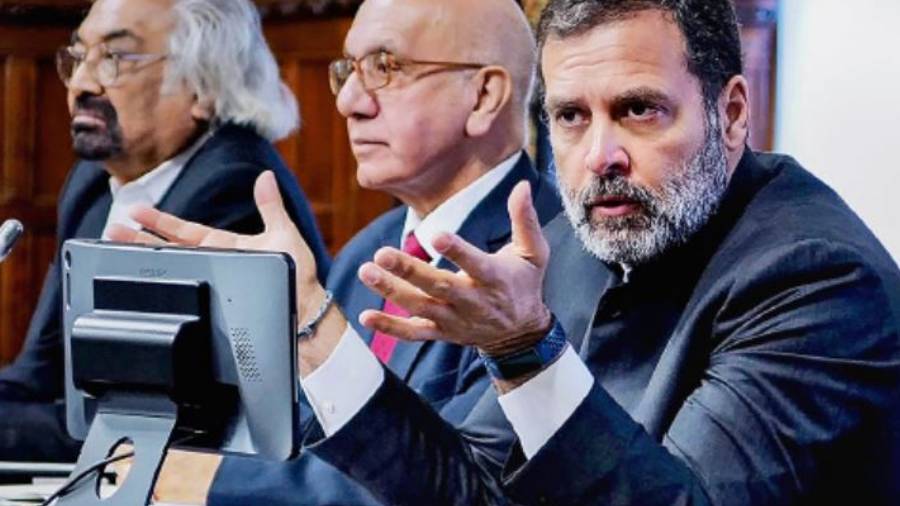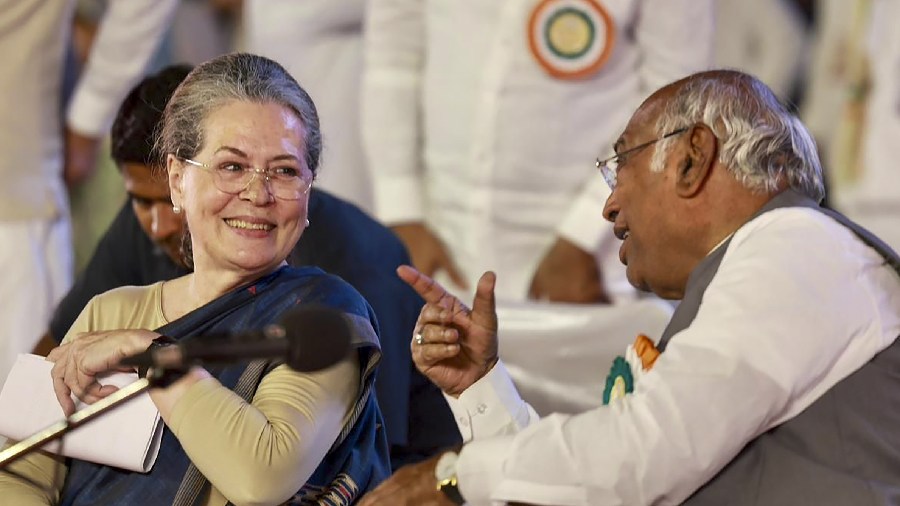Rahul Gandhi can legitimately claim he has not “defamed India” on his weeklong tour of the UK. But he has certainly been forthright in his condemnation of the BJP and the RSS.
On Monday evening, when the Congress leader rounded off his visit by going to the Royal Institute of International Affairs at Chatham House in London, he described the RSS as a “fundamentalist, fascist organisation”.
Since this was relatively new territory for many English members of the audience, he was asked an innocent question: “What is the RSS?”
For once, normal “Chatham House rules”, under which speakers are not quoted in the media to allow for frank discussion, were waived so that everything Rahul said was on record.
He began with a preamble: “When I joined politics in 2004, the democratic contest in India used to be between political parties. I had never imagined at that time that the nature of the contest would change completely. If you had even told me that, I would have said that it was a ridiculous thing to say. But the nature of the democratic contest in India has completely changed. And the reason it’s changed is because of one organisation called RSS.”
And then he set out what he thought of the Rashtriya Swayamsevak Sangh.
“RSS is a fundamentalist, fascist organisation which has basically captured pretty much all of India’s institutions. You can call it a secret society. It’s built along the lines of the Muslim Brotherhood. And the idea is to use the democratic contest to come to power and then subvert the democratic contest afterwards.
“And it shocked me at how successful they’ve been at capturing the different institutions of our country – the press, the judiciary, Parliament, the Election Commission. All the institutions are under pressure, under threat and controlled in one way or the other. The conversation, the voice, that was free-flowing, the debates, those have all stopped.
“The trend you see is a massive concentration of wealth and power. If you really look at the BJP and see what’s the one big thing that they’ve done, it’s a huge concentration of power in the Prime Minister’s Office, and then a huge concentration of wealth in the hands of two or three people. A country the size of India simply cannot be run like that.”
There was an impassioned intervention from Malini Mehra, who runs “an international parliamentary organisation that works on climate change”, who raised a question “as a citizen of India”.
She asked Rahul about “the democratic despair that the country is in” and described herself as “one of possibly millions who no longer recognise the country that they were born and raised in”.
Rahul encouraged her by asking: “Is that a bad thing –- or a good thing?” Malini: “Why am I here?” Rahul: “I don’t know.”
Malini: “I’m here because I am feeling wretched about the state of my country. Absolutely wretched. My father was an RSS man, proudly. He would not recognise the country (today), bless his soul. For those of us who are outside of India, how can we engage? How could we re-empower our democracy?
Malini: “Twenty years ago, I worked with Professor Amartya Sen. Amartya didn’t let go of his passport…. I’m not getting rid of my passport. And I want to know, what can we do to reanimate our democratic institutions?”
Rahul: “I like your energy. It’s very important. And it goes to the point of the resistance. The resistance is sitting here…. The battle for the democratic institutions of India is, frankly, India’s responsibility and no one else’s. And it’s something that we’re doing.
“But you, of course, are Indian. So it’s your responsibility as well.... What you said about your father being in the RSS, and about him not recognising our country... by expressing yourself and by making your position clear, you’re already helping in a big way.
“By telling people the values that you stand for, the values that are Indian and that you protect by telling everybody in the rest of the world that India needs to go back to those values, you are doing the service. So thank you.” Rahul received a round of applause when he spoke of his determination to tackle violence against women.
During the Bharat Jodo Yatra, “a lot of women came up to me, and quite a few of the women spoke about violence that had been done to them”. One woman revealed she had been raped but turned down Rahul’s offer to call in the police. “And I said, ‘Why don’t you want me to call the police? You’ve come here. You’ve told me this. And now you don’t want me to call the police?’
“And she says, ‘I don’t want to call the police – because then I will be shamed’.” Rahul summed up: “To me, that was a very striking thing. Here’s this young girl who suffered this violence against her. And now she cannot act on that violence because she’s scared that she will be shamed.
“I was thinking to myself, this poor girl is now going to live the rest of her life, never telling anybody this and it’s going to multiply the pain of what happened to her. So that is something I think I would like to change – the level of violence against women reduces and particularly this idea of shame, which is a completely ridiculous idea, is changed.”












